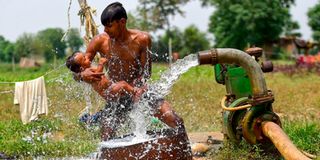WMO’s climate report a global wake-up call

A man gives a bath to his son with a water tube well near a field as the temperature rises in New Delhi on June 10, 2020.
The State of the Global Climate 2024 report by the World Meteorological Organization (WMO) presents a stark reality: 2024 is officially the hottest year on record, with global temperatures rising 1.55°C above pre-industrial levels.
This surpasses the critical 1.5°C threshold outlined in the Paris Agreement and raises urgent questions about global preparedness for the consequences of a rapidly warming planet.
While the report confirms what scientists have long warned—that climate change is accelerating—its implications extend far beyond rising temperatures. The report highlights record-breaking sea level rise, extreme weather events and unprecedented food and water security disruptions, all of which have profound economic consequences. For Africa, a continent already grappling with structural economic challenges, these are significant threats to development and stability.
Climate change is no longer an abstract future risk—it is an active disruptor of economies. The WMO report reveals how extreme weather events displaced more than 800,000 people worldwide and inflicted billions in economic losses. The Kenyan government estimates that recent droughts cost the economy over $1.5 billion annually. Governments are being forced to divert development funds to emergency responses, while businesses face losses from disrupted supply chains and reduced productivity.
The report underscores an often-overlooked consequence of climate change: its impact on human health. Rising temperatures have fuelled a surge in vector-borne diseases such as malaria and dengue fever, further straining already fragile healthcare systems. The economic burden of treating climate-related illnesses, compounded by lost productivity due to heat stress, presents a growing challenge for governments and businesses alike.
Research institutions and policymakers must collaborate to identify effective and sustainable climate interventions. For example, the Africa Research and Impact Network, supported by the UK’s Foreign, Commonwealth & Development Office, has been conducting extensive studies on climate adaptation interventions across East Africa. The findings reinforce a critical takeaway: investments in adaptation are not just environmental necessities—they are economic imperatives. Every dollar spent on climate adaptation saves governments multiple times that amount in disaster response and recovery.
The WMO’s findings should serve as a wake-up call for leaders, businesses and financial institutions. The report highlights the urgent need to scale up climate financing, especially for developing nations that bear the brunt of climate change despite contributing less than 4 per cent of global emissions.
Africa, with its vulnerabilities and its potential for resilience, must seize this moment. The data is unambiguous, the impacts are undeniable, and the time for debate is over. The question is whether governments, businesses, and society at large will finally respond with the urgency demanded by the science.
The writer is an adaptation specialist and communications manager at Africa Research and Impact Network.


